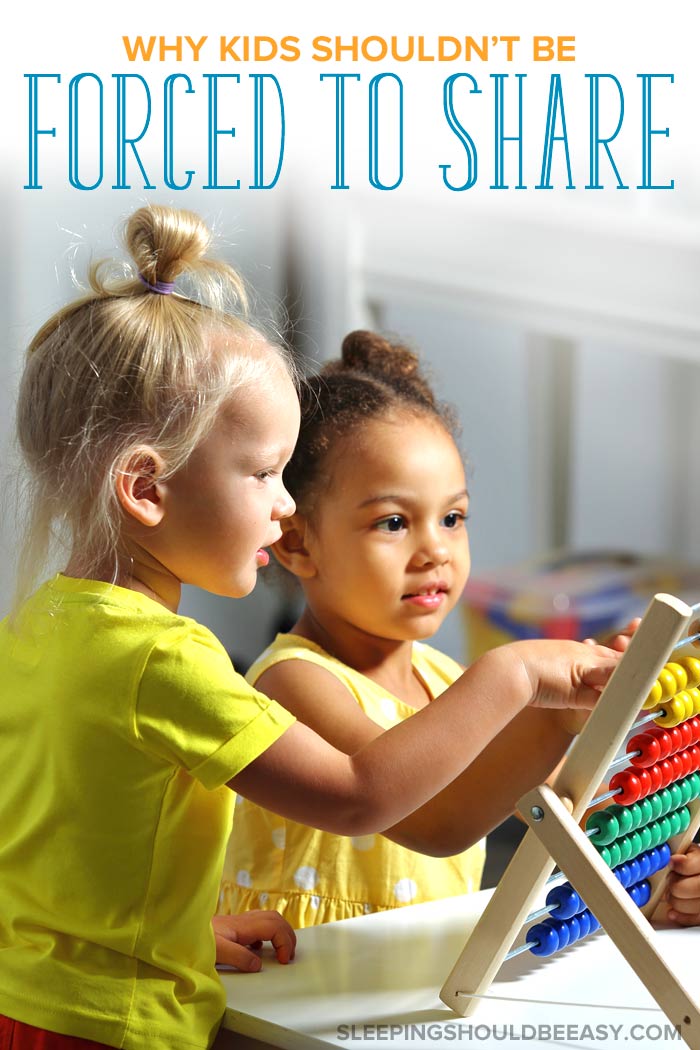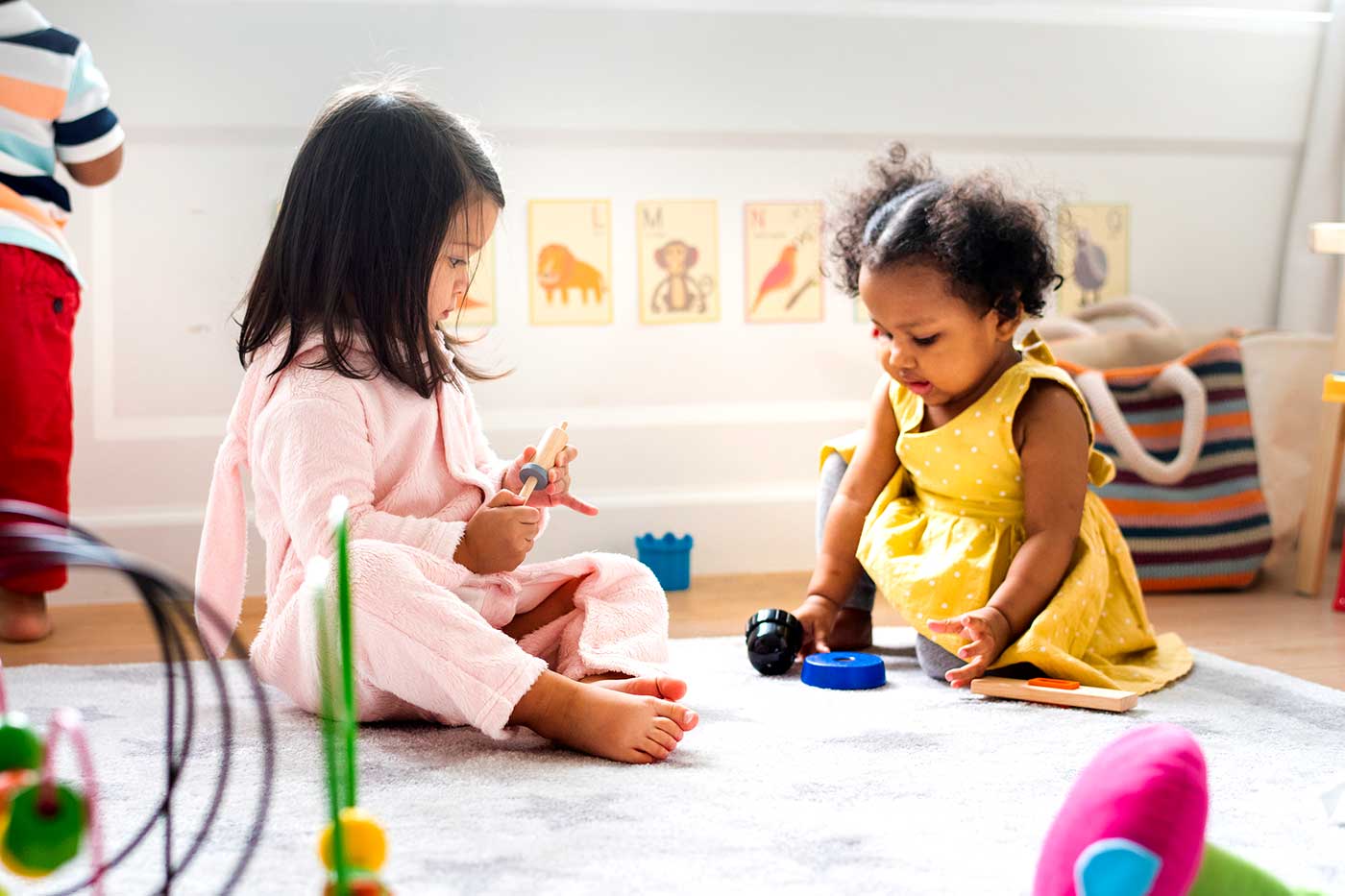Why Kids Shouldn’t Be Forced to Share (And What to Do Instead)
Do you make your children share when they fight, or because you think it’s polite? Head’s up: See why kids shouldn’t be forced to share.
 My two-year-old was scooping sand at the park when another toddler walked over, stood nearby, and clearly wanted to have a turn with the shovel.
My two-year-old was scooping sand at the park when another toddler walked over, stood nearby, and clearly wanted to have a turn with the shovel.
Now, in the past I would’ve felt inclined to encourage my son to share the shovel with the boy. After all, we want to teach generosity and sharing, and another child wanting the shovel seemed like a good opportunity.
But at that point, I knew better.
Because I’ll let you in on a little secret: I don’t think kids should be forced to share.
Table of Contents
Why kids shouldn’t be forced to share
Instead, I told my son, “It looks like he wants to play too. Do you want to take turns scooping the shovel? Maybe you can hand him the shovel so he can scoop, and when he’s done, you can take a turn.”
He obliged, and both boys took turns handing the shovel back and forth as each one finished his turn.
Yes, sharing is good, but we can find better ways to promote this value than by forcing it on our kids. Doing so can have negative effects—they don’t honor their curiosity or encourage social skills.
Take a look at these top reasons why kids shouldn’t be forced to share, as well as what we can do instead:
1. Kids are still focused on the activity
Kids should have an opportunity to share when they’re ready instead of being forced. They’re still absorbed and focused on shoveling, playing, building, and exploring. They shouldn’t be forced to stop because another child wants the same thing.
No wonder kids pout about sharing: they weren’t finished with learning or playing yet.
Imagine playing a game on your phone and your sister walked over, peeking at what you’re doing. Suddenly your husband says, “Okay, hand it over to her now. You have to share.”
Kids are more likely to think that sharing is good when they take the initiative. Otherwise, they’ll think of sharing as a punishment rather than an act of kindness and generosity.
Free resource: Want to learn more about how to help your kids learn how to resolve social conflict (plus other parenting tips you can apply right away)? Join my newsletter and grab the bonus chapter of Parenting with Purpose at no cost to you:
2. Forced sharing isn’t respectful
One reason I don’t force my kids to share and give up an item is because I want them to stand up for what’s important to them.
Kids shouldn’t feel like they have to relinquish something they value because someone else wants it. If an item is important to a child, he should learn that it’s okay to hang on to it for a bit. That he shouldn’t always give up what he truly wants, and that others shouldn’t push him around or tell him to keep quiet.
His behavior shouldn’t be mean, but he still knows that his feelings and wants are valid. If he has enough conviction for something, he should feel like he doesn’t have to give it up right away.
When the opportunity to share comes up, ask your child if he wants to, rather than taking it away without his consent. This is a simple act of respect—I can’t imagine forcing adults to share without asking. We should give the same respect to children, too.
3. Kids don’t learn the ability to resolve social conflicts
A downside of forced sharing is denying your child the ability to resolve her own social conflicts.
It’s painful to see kids in conflict because we don’t want their feelings hurt, especially over simple problems. We’re inclined to avoid conflict by forcing one child to share the item with the other even if she doesn’t want to.
But take a step back and be a moderator or a referee instead, at least initially. Social conflict can be a learning experience. As awkward or difficult as it may be to witness difficult emotions, they’ll learn about empathy and self-regulation than simply being forced to share.
See why we shouldn’t resolve our children’s social conflicts.

4. It’s not about us
Why do we feel like good parenting means forcing kids to share?
One reason is because our parents told us to share in our own childhood as part of having good manners. We accept forced sharing as the normal thing to do.
Another is that sharing is a wonderful value to instill in our kids, so we assume we have to force them to do so when the opportunity comes up.
And finally, we force them to share to save face with others—we don’t want to be those terrible parents with kids who don’t share. As if to tell the other mom, “Oh no, he’s usually an angel. I don’t know why he’s acting this way. This is so not like him!”
The thing is, all these reasons are about us. While the intent is good, young kids are too young to understand the idea of sharing the way we do. To their ego-centric point of view, everything is theirs. When adults talk about sharing, they get upset and don’t understand why.
What to do instead
As I’ve said, sharing itself is a good value and skill to teach our kids. It’s forcing them to do so—and the way we do—that’s the problem.
Still, at some point, your child will face another who will want his turn on the swing or a chance to scoop sand with a shovel. Even with all the reasons you shouldn’t force your child to share, at some point, you still want to encourage him to do so.
If kids shouldn’t be forced to share, what should you do instead?
1. Encourage turn-taking
One of my favorite ways to handle more than one child wanting the same thing is through turn-taking. Not all toys or activities are suited for multiple-use or group play. And if they all want a turn at it, then the only way to make it work fairly is through child-directed turn-taking.
For instance, if your kids are fighting over a toy, set a timer for each child. The first gets to use it for, say, 10 minutes, before handing it to the other.
Even better: Highlight the positive outcomes of turn-taking. See who can make the ball bounce the highest, or how high they can scoop the mountain of sand from their combined efforts.
Expert tip
Kids usually don’t mind sharing, so long as it’s not right away. If your child is still using the swing even if another wants a turn, say, “You’ve been at the swing for a while now. How about 10 more pushes and then we let someone else have a go?”
Learn how to stop kids from fighting.

2. Let the kids determine how to play together
If you’ve been tempted to get “two of everything” because you have two kids, you might want to rethink that.
Research has shown that scarcity breeds cooperation. Fewer toys means kids are forced to figure out how they can both play with the toy and are more likely to value and take better care of it. And they’ll learn the patience to take turns and share, turning a problem into a fantastic lesson.
See how they can use a single toy to better cooperate with one another. Rather than forcing one child to give up a toy because the other wants it, see what solutions they can come up with so they both get what they want.
3. Phrase sharing in a positive light
Have you noticed how you talk about sharing with your kids?
One child might start whining for her turn with the tablet, to which you respond with, “Share the tablet with your sister already!” Not exactly a positive view of sharing, especially when it sounds like punishment.
Instead, focus on the positive side of sharing. Highlight the times when someone shares with them (“That was so nice of him to give you a turn on the slide!”). And praise them for finding a way to play together (“I love how you’re both using the fire truck together”).
Even if you still need to encourage them to share, you can do so in a positive way. “Looks like he likes your fire truck. Maybe you can show him how it works.”
And lastly, highlight the friendship and social aspects of sharing. If another child approaches yours at a play date, you can say, “Looks like you have a new playmate now!” or “Let’s see who can throw the ball the farthest.” Friendships and cooperation—not simply having the toy—become the benefit.
Get more tips on how to teach toddlers to share.

4. Honor your child’s intentions
If your child doesn’t want to give up the swing, share the shovel, or hand over the ball… let it go.
He isn’t any worse off for not sharing. He might be having an off day, or too focused on playing right now. Perhaps he wants to be alone, or a toy may be important to him.
All those reasons aren’t bad—they don’t make him any worse than someone who’s in the mood to share and socialize.

Conclusion
Kids shouldn’t be forced to share, especially when they’re still focused on an activity. Forcing them to share can also be disrespectful and denies them the ability to resolve social conflict. Plus, we often forget that it’s not so much about us as it is about guiding them through these situations.
Instead of forcing them to share, encourage turn-taking so each child can learn to cooperate and share fairly. Let them determine the best ways to both play. Phrase sharing as a positive, not a dreaded punishment.
And if all else fails, honor your child’s intentions—he truly isn’t any worse off because he’s still too focused to share.
That day at the park, my toddler learned how to take turns passing a shovel back and forth with another child. He wouldn’t have learned how to take turns—much less build the cool mountain of sand they made—if I had simply forced him to share.
Get more tips:
- 7 Ways to Teach Your Toddler to Share
- 9 Playground Rules You and Your Kids Should Remember
- Is Your Child Rejected by Peers? Here’s What to Do
- Why You Shouldn’t Solve Your Child’s Social Conflicts
- What to Do When Your Child Refuses to Apologize
Don’t forget: Join my newsletter and grab the bonus chapter of Parenting with Purpose at no cost to you:

